SAVING KASHMIRIYAT
A man feeding pigeons during curfew and strike in Srinagar, the summer capital city of Jammu and Kashmir, July 27. (S. Irfan | PTI)
The picturesque Valley of Kashmir is once again gripped in the throes of an extreme unrest, a dangerous and unanticipated one that caught the security apparatus and New Delhi in an awkward position. It was the killing of 22-year-old Burhan Wani, a militant commander of Pakistan-backed terror outfit, Hizbul Mujahideen, by police forces that re-ignited the separatist (separation from India) fire that once burned the region in the 1990s. Undeniably, the onus is India’s to delve into the real problems of the current crisis as a large portion is still with it, writes Priyanka Bhardwaj. – @siliconeer #siliconeer #kashmir #india #society #kashmiriyat
Wani’s regular social media updates demanding “azaadi” (freedom) from “occupying Indian forces” and brazen encouragement to take up weapons for the cause bore a strong influence as last year’s records showed a sudden upsurge in fresh recruits among terror outfits.
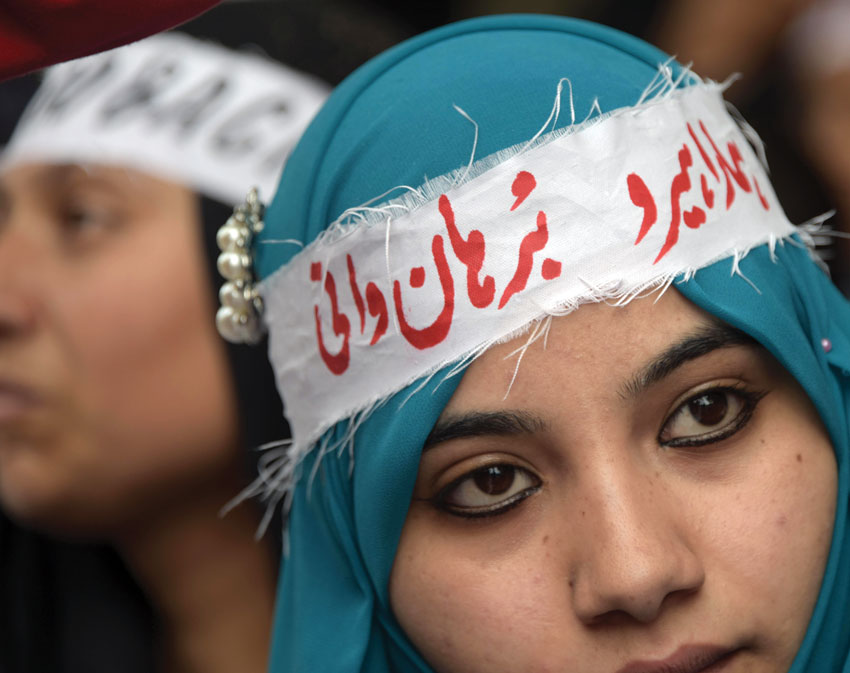
Yet the victims of his feats of murder and intimidation were not just the security establishment but ordinary citizens and sarpanches (village headmen), a few of them had dared to file FIRs against him.
Despite all this, the news of Wani’s death spread like wildfire, and at least a hundred thousand locals turned up in his funeral procession to mourn and pay homage to his killing at the hands of the police.
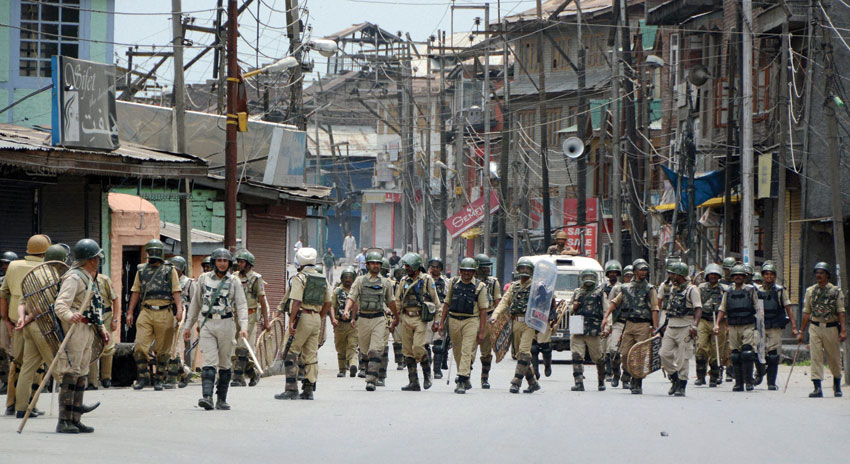
Wani, who belonged to an educated family and had never been trained in Pakistani camp like erstwhile militants of various factions operating in Kashmir, had acquired a huge fan base among Kashmiri youth in a short span of six years of his enlistment.
The state government run by Peoples Democratic Party-Bharatiya Janata Party ordered curfew and massive clamp down, alarmed by the overwhelming emotional response of the locals and also to contain clashes between the people and police.
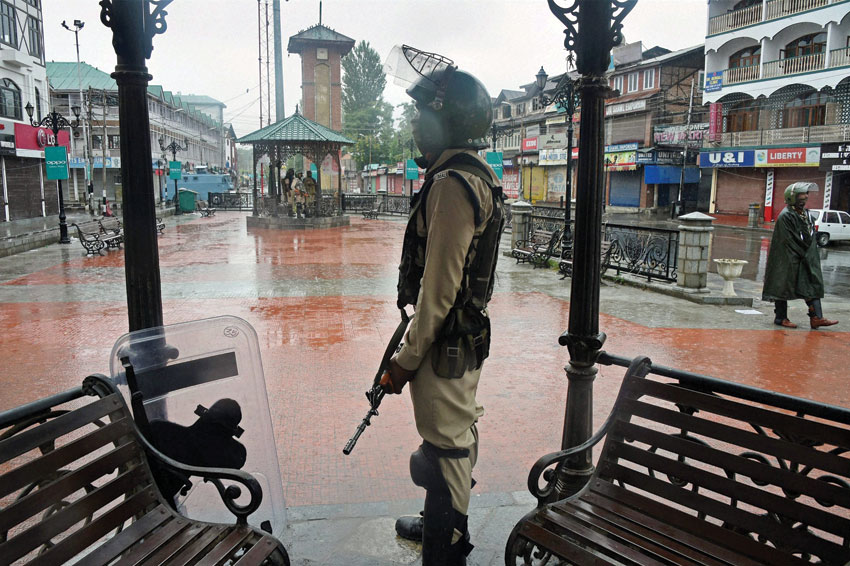
General life came to a halt as media and social media was blackened, Internet facilities snapped, shops and schools shut, ATMs became non-functional, petrol pumps ran dry and even basic amenities went out of stock.
Still during late morning hours numerous young men, in masks and bandannas, sneaked into alleys to hurl stones and throw burning tires at the sorties of police and paramilitary forces.
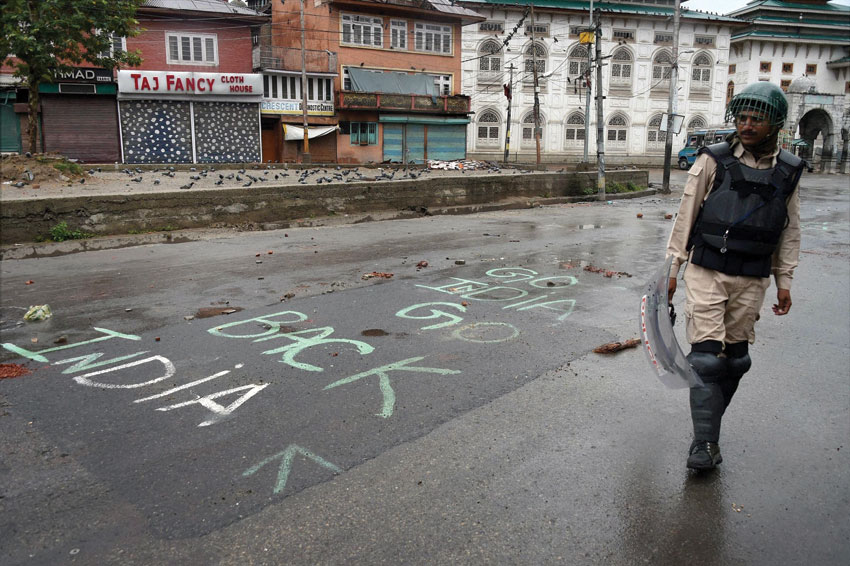
The attacks targeting Indian army, paramilitary forces, and the police in Kashmir has been on the rise and has claimed lives of many, including civilians. As a result, to quell the attacks the police’s use of bullets, pellets and smoke bombs resulted in more than 45 dead, 1,500 injured and more than a dozen blinded, further earning the wrath of locals and even political party leaders in New Delhi and various parts of the country.
While all this was on, Pakistan lost not a moment to tap into the local resentment to buttress its, as always, illegal and untenable claim over Kashmir by proclaiming Wani a “hero” and taking the matter to the United Nations (UN).
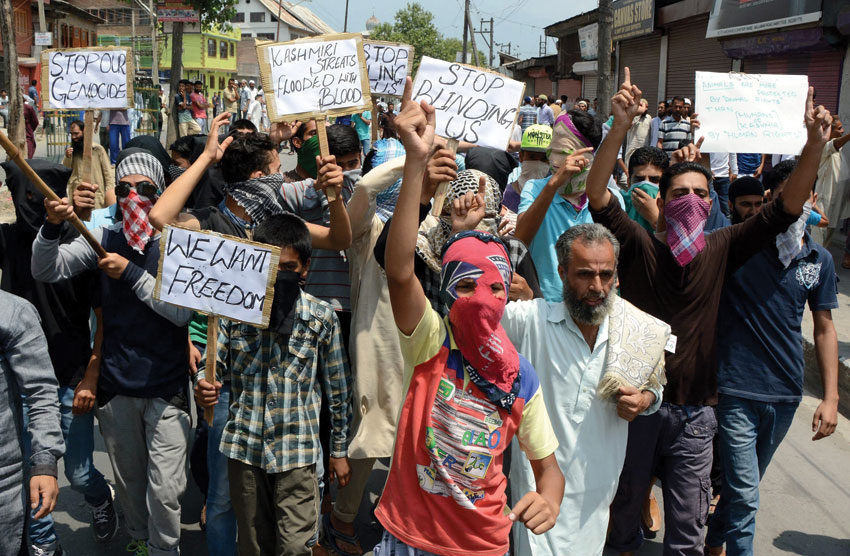
However, India’s Permanent Representative to UN, Syed Akbaruddin effectively countered Pakistan’s sinister moves by elaborating the Islamic country’s deliberate “misuse” of the UN forum and its historic shielding of designated terrorists on its territory and glorifying terrorists.
Shocking as it may sound solidarity to “jihadi martyr,” Wani came from none other than Lahore-based Hafiz Saeed, the founder of terrorist group Lashkar-e-Toiba (the organization that trained Ajmal Kasab to carry out the deadly 26/11 Mumbai attacks) and declared as a “wanted terrorist” (with a U.S. bounty of $10 million on his head), and he led public protest marches in Pakistan’s major cities such as Lahore and Islamabad.
Post 1971 Indo-Pak War, a severely vanquished Pakistan resorted to covert means to attack India through open funding, training and support of “Khalistani” (who demanded a free Khalistan but were successfully contained) and “jihadi” terrorists who are fighting it out in Kashmir.
Going back at the turn of this century, Pakistan had extended its support to Hizbul Mujahideen vis-a-vis pro-independence group Jammu & Kashmir Liberation Front as the former spoke of uniting Kashmir with Pakistan while at the same time raising the bogey of “human rights violations” at every prominent global fora.
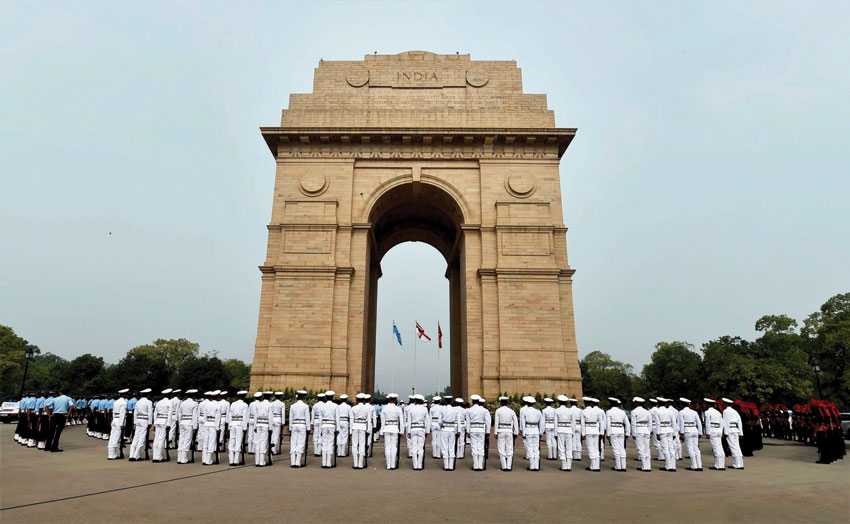
Time and again, it has been acknowledged by Amnesty International and the UN, that Pakistan is guilty of genocide and employing repressive and discriminatory policies towards the ethnic population of Balochistan, where it illegally wrested control in March 1948, violating all international norms of sovereignty and human rights.
As an arid and mountainous province with immense strategic importance and rich reserves of gold, natural gas, coal, minerals and livestock, the province makes for more than 44% of Pakistan’s total land area, though it comprises just about 13% of the population (largely Sunni Muslims).
Lured by these prospects, Pakistan’s industrial-army mafia establishment has never stopped from conducting aerial bombings, artillery strikes and machine gun attacks, and more recently with the help of weapons provided by the West to fight its war on terror, the province has become a stage of war and abductions, torture, killings, unexplained disappearances and rapes have become the order of the day.
While in the instance of Kashmir, it is a wholly different issue as the Raja of Jammu & Kashmir (Hindu dominant state but with Muslims in Kashmir Valley and Buddhists in Ladakh) who wanted to stay independent hurriedly signed the Instrument of Accession to join India in October 1947 when Pashtun tribals were sent by Pakistan to raid and capture Srinagar.
But over the decades the political regression alienated the Kashmiris and in the wake of the separatist-militant demand, in 1990s, and the subsequent fleeing of Hindus from the Valley, the bastion of a proud, syncretic “Kashmiriyat” stood decimated.
It is time the current resident Kashmiris realize that a deliberately transformed demography would not qualify it to harp on a referendum and shed its dangerous romanticism of violence and gun culture.
Any imagined embrace with a non-secular, Islamic Pakistan or an expansionist, atheist and Communist China, both of which have already and illegally occupied parts of Kashmir will be final nails on the coffin of “Kashmiriyat” or for that matter “insaniyat” (humanism).
Undeniably, the onus is India’s to delve into the real problems of the current crisis as a large portion is still with it.
And the problems are not simple development or local armed insurrections issues but one of political apathy that found their narration in Wani’s death.
Once the army steps out, it would be Prime Minister Narendra Modi’s prime duty to chalk out a prudent, long-term policy that grants a dignified constitutional place to wishes and aspirations of all stakeholders in India’s democratic republic, and forsake the occasional chest thumping.
The Center needs to send a strong message that it values Kashmiris as much as it values Kashmir, the land of built by Rishi Kashyapa.


